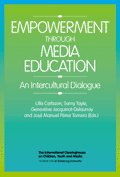Empowerment Through Media Education
An Intercultural Dialogue
Although media, digital and information divides do exist in the world, more and more people have access to a steadily swelling flow of material through many new channels. An interactive and mobile media society has grown up alongside the traditional mass media society. Passive media consumers are becoming active media producers. In the midst of these developments are children and youth. Many parents, teachers and policy-makers are concerned about the negative influence they believe media exert on young people. The media, however, are also valued as social and cultural resources. It is in this complex context that we must see the importance of media literacy and media education. But when issues such as these are discussed, all too often the frame of reference is the media culture of the Western world. There is an urgent need for the agenda to become open to non-Western thoughts and intercultural approaches.
This book is based on international conferences on media education in Riyadh and Paris 2007. Scholars and other experts present conclusions from experiences and research to date on media education from a variety of perspectives and different cultures.
Content
Acknowledgement
Foreword
I. Introductions
Media Education, a Crucial Issue in the Building of an Inclusive Knowledge Society
Abdul Waheed Khan
Empowerment Through Media Education. An Intercultural Approach
Geneviève Jacquinot-Delaunay, Ulla Carlsson, Samy Tayie, José Manuel Pérez Tornero
II. Why Media Education? The Grünwald Anniversary
From Grünwald to Paris. Towards A Scale Change?
Evelyne Bevort, Divina Frau-Meigs, Geneviève Jacquinot-Delaunay, Catherine Souyri
The Paris Agenda. 12 Recommendations for Media Education
Grünwald Declaration on Media Education
MediaEducation: quand il n’est plus temps d’attendre… Media Education: When the Waiting is Over
Geneviève Jacquinot-Delaunay
III. Young People’s Media Culture in the Digital Age
Children and Mass Media in the Arab World. A Second Level Analysis
Samy Tayie
The Appropriation of New Media and Communication Tools by Young People Aged 12-18 in Europe. New Trends for Media Education
Evelyne Bevort, Patrick Verniers
IV. Education and Media Culture in the Context of Media Literacy
Media Literacy. New Conceptualisation, New Approach
José Manuel Pérez Tornero
A European Approach to Media Literacy
Matteo Zacchetti, Philippos Vardakas
Educational and Mass-Media Cultures: Integration or Contradiction
Saeed Abdallah Hareb
I, Myself and The Other. In the Light of Educational Culture and the Media Culture: Integration or Contradiction?
Essmat Sweedan
Young People, Media Education and Civic Engagement in the Postcolonial World
Sanjay Asthana
Multidimensional and Multicultural Media Literacy. Social Challenges and Communicational Risks on the Edge between Cultural Heritage and Technological Development
Vitor Reia Baptista
V. Media Education in the Digital Age
Media Education. Crossing a Mental Rubicon
Divina Frau-Meigs
The Role of School Media Education
Muhammed El-Khateeb
Media Education and School Curriculum
Susanne Krucsay
Introducing Multimedia in the Classroom
Pier Cesare Rivoltella
Developing Skills of Interaction with the Screen in Saudi Families
Hanan Ashi
Role of the Family in Forming the Rational Interaction with Mass Media. A Case Study of a Saudi Family
Fathia Al Qurashy
Media Education. International Strategies
Cary Bazalgette
VI. Media Literacy in Practice
Transforming Literacy
Cary Bazalgette
Teaching about Media. Media Education, Learning, and Literacy: Sketching a Dialogic Process
Sanjay Asthana
Educational Television and School
Susanne Krucsay
New Educational Needs. Distance Training and Life-long Learning for Teachers
Geneviève Jacquinot-Delaunay
The Authors

